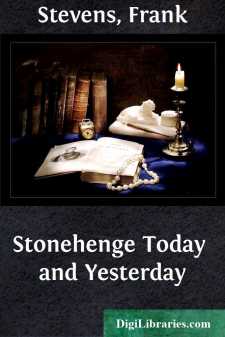Non-Classifiable
- Non-Classifiable 1768
Non-Classifiable Books
Sort by:
FRANK REYNOLDS. I. It has been said of Tolstoy, anatomising the grim skeleton of human nature, that his writings are more like life than life itself. Of Frank Reynolds, with gently satirical pen and pencil depicting the superficial humours of modern life, it might be said that his drawings, too, are more humanly natural than real flesh and blood. It is the peculiar faculty of the true observer that his...
more...
MY TRIP TO VERDUN—GENERAL PÉTAIN FACE TO FACE THE MEN WHO HOLD THE LINE—WHAT THEIR FACES TOLD OF THE PAST AND THE FUTURE OF FRANCE My road to Verdun ran through the Elysée Palace, and it was to the courtesy and interest of the President of the French Republic that I owed my opportunity to see the battle for the Meuse city at close range. Already through the kindness of the French General Staff I...
more...
by:
Frank Stevens
SALISBURY PLAIN "We passed over the goodly plain, or rather sea of carpet, which I think for evenness, extent, verdure, and innumerable flocks, to be one of the most delightful prospects in nature."—"Evelyn's Diary," 1654. There is not a county in England which does not pride itself upon some outstanding characteristic which places it in a category by itself. And if there be a...
more...
CHAPTER I MEASURES SHORT OF WAR FOR THE SETTLEMENT OF INTERNATIONAL CONTROVERSIES SECTION 1 Friendly Measures Of the letters which follow, the first was suggested by a petition presented in October, 1899, to the President of the United States, asking him to use his good offices to terminate the war in South Africa; the second by discussions as to the advisability of employing, for the first time, an...
more...
INTRODUCTORY. IT is about twenty-five years since, at my earnest desire, my father began to write some of the memories of his own life, of the friends whom he loved, and of the noteworthy people he had known; and it is by the help of these autobiographical papers, and of selections from his letters, that I am enabled to attempt a memoir of him. I should like to remind the elder generation and inform...
more...
NOBLE SOCIETY OFCOLLEDGE-YOUTHS. Gentlemen, I have seen a Treatise intituled, de Tintinnabulis—that is, of little Bells, the Language Latin, but pen'd by a Dutchman, being a Discourse of striking tunes on little Bells with traps under the feet, with several Books on several Instruments of Music, and Tunes prick't for the same; Then considering that the Well-wishers to either of them, took...
more...
CHAPTER I ON WAGNER CRITICISM A new work on Wagner requires some justification. It might be urged that, since the Meister has been dead for some decades and the violence of party feeling may be assumed to have somewhat abated, we are now in a position to form a sober estimate of his work, to review his aims, and judge of his measure of success. Such, however, is not my purpose in the following pages. I...
more...
Heroes of the Lifeboat and Rocket. Skirmishes with the Subject Generally. It ought to be known to all English boys that there is a terrible and costly war in which the British nation is at all times engaged. No intervals of peace mark the course of this war. Cessations of hostilities there are for brief periods, but no treaties of peace. “War to the knife” is its character. Quarter is neither given...
more...
by:
John Abercrombie
NATURE AND IMPORTANCE OF THE SCIENCEOF THE MORAL FEELINGS. Man is to be contemplated as an intellectual, and as a moral being. By his intellectual powers, he acquires the knowledge of facts, observes their connexions, and traces the conclusions which arise out of them. These mental operations, however, even in a high state of cultivation, may be directed entirely to truths of an extrinsic kind,—that...
more...
by:
Selwyn Brinton
n considering the work of one of the greatest of the masters of the Renaissance, we have to go further back than the disputed question as to who was the first teacher of Pietro di Cristofano Vannucci—surnamed by his contemporaries "il Perugino," the Perugian—and to inquire into the more interesting story of his predecessors in that wonderful School of Umbria, on which his art puts, in a...
more...











